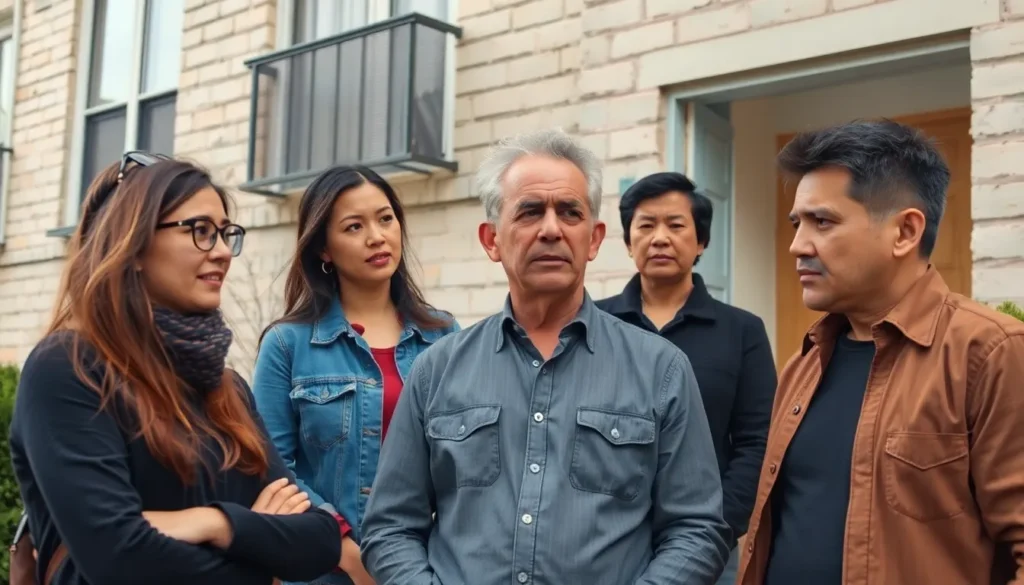Navigating the world of rental agreements can sometimes feel like stepping into a labyrinth, complete with dead ends and hidden traps. Seriously, if you’ve ever felt like a mere pawn in your landlord’s game, you might not be alone. An attorney for tenant rights can be your guiding light, ensuring you not only recognize your rights but also wield them like a pro. From understanding lease agreements to combating unfair evictions, let’s jump into the essential knowledge every tenant deserves to have, and trust us, it’s more thrilling than it sounds.
Table of Contents
ToggleUnderstanding Tenant Rights

Every tenant should start with a solid foundation: knowing their rights. Tenant rights are designed to protect individuals renting residential properties. They often cover aspects like the right to a habitable living condition, protections against discrimination, and the right to privacy.
In many jurisdictions, tenants have the immense right to be informed about their leases or rental agreements. This means you should always read your lease thoroughly before signing it.
Also, it’s vital to understand that each state has unique rules governing landlord-tenant relationships. For example, California has strict laws about security deposits, while Texas might allow for different practices. As a result, familiarity with local regulations can prevent unnecessary conflicts. Ignorance is not bliss in the rental world: it can lead to disastrous outcomes.
Eventually, understanding your tenant rights not only empowers tenants but also fosters healthier relationships between landlords and their tenants.
Common Violations of Tenant Rights
Unfortunately, even in the most romanticized versions of renting, problems can and do arise. Here are some of the most common violations of tenant rights to be aware of:
- Violation of Privacy: Landlords must give reasonable notice before entering your unit, usually 24-48 hours. If they keep popping in unannounced, that’s a no-go.
- Failure to Maintain a Habitable Environment: If water leaks like a leaky faucet and mold spreads like a viral TikTok, you could have a case for habitability violations. Every tenant deserves safe and secure housing.
- Discrimination: Housing discrimination based on race, color, religion, sex, national origin, familial status, or disability is illegal. If you feel you’ve been treated unfairly, it’s crucial to seek help.
- Unlawful Eviction: Evictions must follow legal processes, and landlords cannot just change locks or throw tenants out without proper notice. If a landlord is attempting such tactics, it’s crucial to act quickly.
When to Hire an Attorney
Knowing when to bring in a professional can be a game-changer. Here are critical moments to consider hiring an attorney for tenant rights:
- Unlawful Evictions: If you receive a notice of eviction, it’s time to consult an attorney. Understanding your legal rights could save you a lot of hassle.
- Habitability Issues: If your appeals for repairs are met with radio silence, legal counsel can help you push for action.
- Discrimination Claims: If you believe you’ve been discriminated against in your renting experience, an attorney can guide you through the intricacies of filing a complaint.
- Breach of Lease: When a landlord fails to uphold their side of the lease, whether through improper notice or not providing essential services, legal advice is invaluable.
What to Expect from a Tenant Rights Attorney
Hiring an attorney doesn’t have to be as intimidating as stepping into a lion’s den. Here’s what tenants can expect:
- Consultation: Expect a thorough initial consultation where they’ll assess your situation, answer your questions, and provide legal advice specific to your case.
- Representation: Whether it’s advocating for your rights in negotiations or representing you in court, a good attorney will stand by your side.
- Documentation: Attorneys can help gather evidence, draft necessary legal documents, and ensure every detail is accounted for. You focus on your life while they manage the legal dance.
- Guidance: Having an expert in your corner takes a lot of stress off your shoulders. It’s like having a personal bodyguard navigating the complex laws that govern tenant-landlord relationships.
How to Choose the Right Attorney
Picking the right attorney can feel like dating, everyone wants the suitable match. Here are key points to consider:
- Experience: Look for an attorney with experience specifically in tenant rights. Their knowledge of local laws can make a world of difference.
- Reputation: Research potential attorneys online. Reviews and testimonials can provide insight into their track record and client satisfaction.
- Consultation Fees: Understand the fee structure up front. Some attorneys offer free consultations, while others may charge a fee. Ensure transparency helps you decide, like picking a restaurant with good reviews and clear menus.
- Personal Rapport: Make sure you feel comfortable discussing sensitive issues. A good attorney should not only be knowledgeable but also someone with whom you can communicate openly.
Resources for Tenants
There’s no need to tackle tenant rights alone. Plenty of resources are available:
- Local Tenant Unions: Many cities have tenant unions that provide support and resources. They often know the ins and outs of landlord-tenant laws specific to your area.
- Legal Aid Organizations: Non-profit organizations often provide free or low-cost legal assistance to tenants. They can be a vital resource for those in financial strain.
- Online Legal Resources: Websites like Nolo, LegalZoom, or state bar associations provide valuable information on tenant rights. Use them as guides, like a GPS that highlights your best routes.













